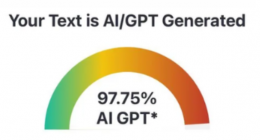In my younger and more vulnerable years I believed that books could one day rival movies in their vividness and complexity. Sadly, civilization’s going to pieces; I’ve gotten to be a terrible pessimist about things. For those of you looking for a little light, spring reading, F. Scott Fitzgerald (or should I say “Eff, Not Fitzgerald!”)’s novelization of the modern classic Baz Luhrmann film, The Great Gatsby, certainly does not fit the bill. That is, unless by “light” you mean that it drains the light from your life, and by “spring” you mean that it makes you want to spring from a cliff’s edge without even finishing the first page. You’d have to be a fool to read any more, but I guess that’s the best thing a reader can be in this world, a beautiful little fool.
Now, before I get too far in this review, let me just say that I’m not some illiterate rube, as people may assume. There are a number of books that I enjoy thoroughly: for instance, William Shakespeare’s adaptation of another Luhrmann classic, Romeo+Juliet, which, while a bit cliché and immature (too much rhyming), was a fun read. Not to mention Fight Club, which was a simple retelling of the movie, and didn’t impose too much on the reader. Sadly, Fitzgerald (more like Shitzgerald, if I may be so bold)’s re-envisioning of Luhrmann’s vibrant, modernist marvel tumbles short of his dreams.
Everyone suspects himself of at least one of the cardinal virtues, and this is mine: I am one of the few honest reviewers that I have ever known. So you can trust me when I scoff at the rave reviews this book has gotten. One four-eyed critic said of this rag “It’s a triumph. What thoroughness! What realism! Knew when to stop, too—didn’t cut the pages. But what do you want? What do you expect?” Well listen here, “Owl-Eyes,” what I want is quality, and this book is not; it is a valley of ashes, the ashes of a beautiful work of art. This adaptation proves you really can’t repeat the past.
The book is unable to capture Luhrmann’s dazzling sets, DiCaprio’s knockout performance, McGuire’s understated subtlty, and it doesn’t even pay homage to the revolutionary soundtrack! Fitzgerald is a careless person—he smashes up things and creatures and retreats back into his money. Of course, it takes two to make an accident, and I am left flabbergasted as to why Luhrmann would ever let such a dishonest adaptation slip under his nose. Really, this travesty has tainted the movie, and so we beat on, boats against the current, borne back ceaselessly into the past.









